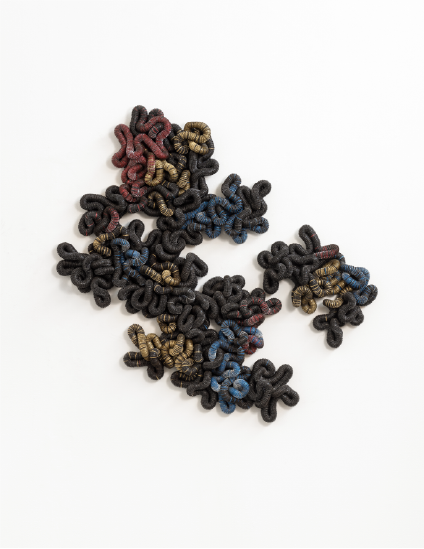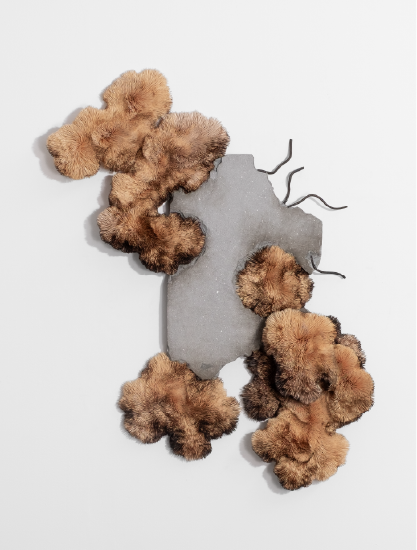“The things that only time will teach us” and “Fugitives”
Chris Soal
The South African artist Chris Soal employs unconventional materials to create art objects that explore themes related to ecology, urbanization and history. Wooden toothpicks, metal bottle caps, and concrete are the primary materials in his work. The artist investigates the history of everyday objects and the oft -overlooked connotations associated with them.

“The things that only time will teach us”
Chris Soal’s artistic practice involves collecting bottle caps from bars and clubs in Johannesburg. For Soal, these bottle caps carry local significance and reference the history of his hometown, which was established during the gold rush and has a long-standing connection to the extraction of this precious metal. The round metal caps resemble coins, prompting Soal to pose the question: “Why is it that in Johannesburg—also known as Egoli or The City of Gold—the only gold you see on the streets is discarded bottle caps?” He emphasizes that the golden, silver, and green caps, when arranged in intricate compositions, visually mimic traditional African textiles adorned with ornaments. By utilizing recycled bottle caps, Soal activates a network of complex associations, linking two key (though contentious ) industries in South Africa: the male-dominated gold mining sector and the stereotypically feminine art of weaving.
The second unconventional material that Chris Soal frequently employs in his art is toothpicks. By utilizing mass-produced birch and bamboo toothpicks, the artist restores their organic essence. Thousands of wooden sticks, assembled into biomorphic shapes, evoke the appearance of animal fur, rippling water, coral or moss. The contrast achieved by combining these elements with concrete and metal rods creates an illusion of paradoxical softness within a composition made of sharpened sticks. Concrete also plays a significant role in Soal’s work. The omnipresence of this industrial material and its proliferation in urban environments are deeply unsettling. When juxtaposed with the natural forms of wooden toothpicks, the concrete blocks in Soal’s pieces symbolize the irreversible damage inflicted upon nature through the process of rapid urbanization—an alteration that can no longer be restored to its original organic form.

“Fugitives”
The ecological context in Soal’s works is evident and extends beyond mere artistic recycling. The artist emphasizes the revaluation of materials and engages with the economic context, demonstrating through his creations how mass-produced, mundane, or even unwanted objects can become unique and paradoxically gain value when utilized in a non-utilitarian manner during the process of artistic transformation. Although Soal is a young artist, having been active in the art scene for only ten years, his work resonates with numerous twentieth-century movements. His use of commonplace objects is reminiscent of the Arte Povera, while the juxtaposition of natural and industrial elements draws inspiration from the Japanese Mono-ha. Additionally, his approach to materials reflects a phenomenological philosophy, striving to “return to the things themselves.”
Text: Anna Bykova
Photos: Matt Slater
